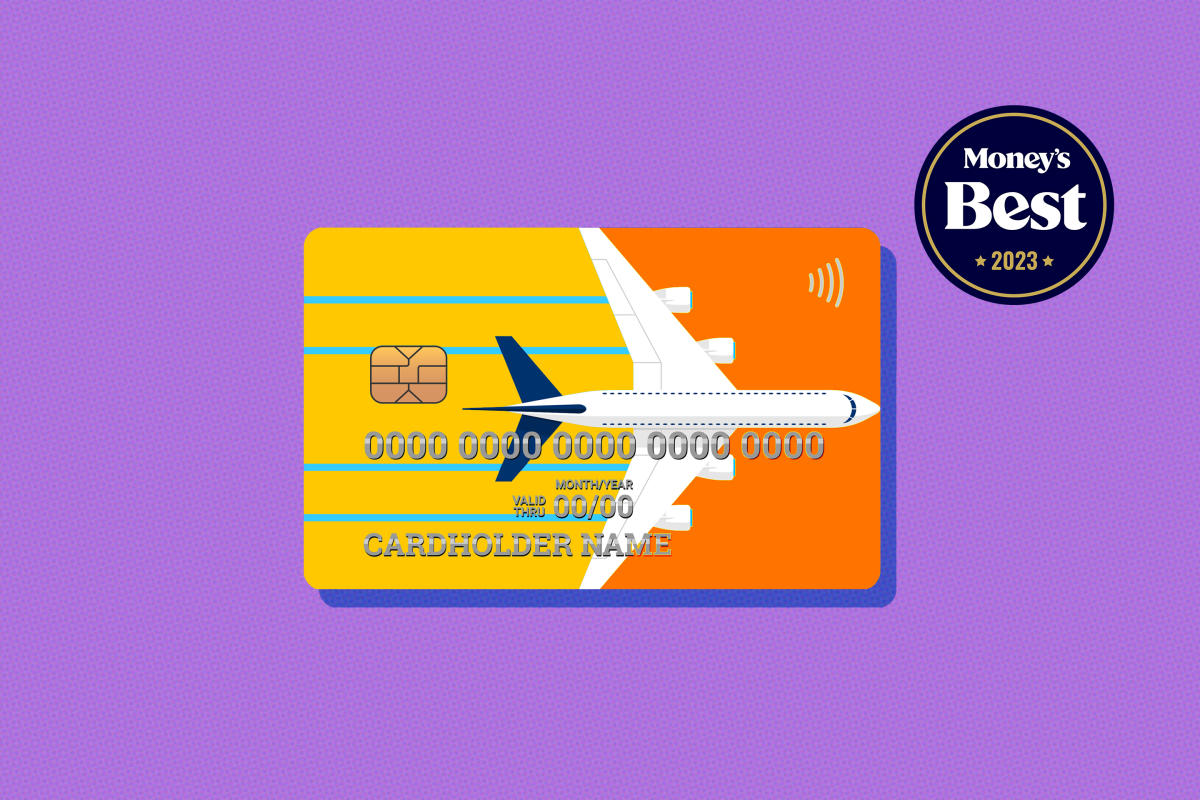Personal Finance
Best Airline Credit Cards of 2023

-
Best for No Annual Fee
United Gateway Credit Card
Our Partner
-
Rewards Rate:
2x miles on United purchases, 2x miles at gas stations, 2x miles on local transit and commuting, including ride-share services
-
Travel Insurance:
Auto Rental Collision Damage Waiver, Trip Cancellation/Interruption
-
Annual Fee:
None
Learn More
-
-
Best for International Travel
United Explorer Credit Card
Our Partner
-
Rewards Rate:
2x miles on United purchases, 2x miles on dining (including eligible delivery services), 2x miles on hotel accommodations purchased directly with the hotel
-
Travel Insurance:
Primary Auto Rental Collision Damage Waiver, Baggage Delay, Lost Luggage Reimbursement, Trip Cancellation/Interruption/Delay
-
Annual Fee:
$95
Learn More
-
-
Best for Families
Southwest Rapid Rewards(R) Priority Credit Card
Our Partner
-
Rewards Rate:
3x points on Southwest purchases, 2x points on Rapid Rewards(R) hotel and car rental partners, local transit and commuting, internet, cable, and phone services, and select streaming providers
-
Travel Insurance:
Lost Luggage Reimbursement, Baggage Delay
-
Annual Fee:
$149
Learn Moe
-
-
Best for Premium Benefits
Delta SkyMiles<sup>(R)</sup> Reserve American Express Card
Our Partner
-
Rewards Rate:
3x miles on Delta purchases
-
Travel Insurance:
Baggage Insurance Plan, Trip Delay,, Trip Cancellation/Interruption, Car Rental Loss and Damage
-
Annual Fee:
$550
Learn More
-
If you frequently fly with the same airline, an airline credit card can help you maximize the miles you earn and provide benefits to enhance your travel experience.
Airlines credit cards can earn between two to five miles (or points) per dollar spent and include benefits such as no foreign transaction fees, free checked bags, annual bonus miles credits and more. They can also help you save money with statement credits and in-flight discounts on food, beverages and Wi-Fi plans.
Read on to check out Money’s picks for the best airline credit cards and a guide to how they work.
Our Top Picks for the Best Airline Credit Cards of 2023
-
United GatewaySM Credit Card – Best no-annual-fee airline card
-
United℠ Explorer Card – Best for international travel
-
Southwest Rapid Rewards® Priority Credit Card – Best for families
-
JetBlue Plus Card – Best for domestic travel
-
Delta SkyMiles® Reserve American Express Card– Best for premium benefits
-
FRONTIER Airlines World Mastercard® – Best for budget travel
Best Airline Credit Cards Reviews
Pros
-
Earn 2 miles on purchases with United, at gas stations and on local transportation
-
No foreign transaction fee
-
Offers 25% back on United inflight purchases
Cons
-
No free checked bag or priority boarding
HIGHLIGHTS
- Annual fee
- Sign-up bonus
- Insurance and protection
Why we chose it: The United Gateway℠ Card is a solid no-annual-fee card that offers valuable perks, such as travel insurance and popular bonus categories.
The card earns 2x miles on United purchases, gas and local transit and commuting — like taxis, trains and Uber. It also gives you 25% back as a statement credit for in-flight purchases and premium drinks at United Clubs.
Cardholders get access to the Chase Luxury Hotel and Resort Collection, a network of more than a thousand establishments. When you book a stay through the program, you can get complimentary daily breakfast, room upgrades, late checkouts and more, when available.
Not many no-annual-fee credit cards include travel insurance. The United Gateway℠ Card, on the other hand, provides coverage for trip cancellation or interruption, and reimburses you up to $1,500 per person ($6,000 per trip) for non-refundable tickets if your trip gets canceled or cut short by covered events, like sickness or injury.
The card also offers auto rental coverage, which can save you some money by letting you skip the rental company’s collision insurance.
(Note that you must pay the entire reservation with your card, and that coverage is secondary. This means that if you have personal car insurance, you will have to file a claim with your primary insurer first, and the card will cover any remaining deductibles. If you don’t have personal coverage, you can file a claim with the card directly.)
Other no-annual-fee cards also feature popular bonus rates, discounts for in-flight purchases and some travel protections. For example, the Delta SkyMiles® Blue American Express Card earns 2x miles on dining and Delta purchases. However, it only includes auto rental coverage and offers a smaller in-flight purchase discount (20%), which is not valid on Wi-Fi plans or Delta airport lounges.
While the United Gateway℠ Card does offer more benefits when compared to other credit cards without an annual fee, do note that it doesn’t offer priority boarding or free checked bags, which are included with airline credit cards with a yearly fee of around $95 or more.
Pros
-
2x miles per dollar on United purchases and dining
-
Comprehensive travel insurance
-
$100 statement credit for TSA PreCheck, Global Entry or NEXUS
-
2 United Club? one-time passes per year
Cons
-
Only two people per reservation get a free checked bag
HIGHLIGHTS
- Annual fee
- Sign-up bonus
- Insurance and protection
Why we chose it: The United℠ Explorer Card gives cardholders access to valuable benefits that make its low annual fee worthwhile, and it earns miles that can get you flights to more than a hundred international destinations.
United flies to over 210 domestic destinations and 120 international ones across six continents — and it continues to expand its routes, placing the airline at the forefront of international travel. Recently, United announced it would service 37 cities in Europe, Africa, India and the Middle East during the summer of 2023.
The United℠ Explorer Card earns 2x miles per dollar on United purchases and dining. Hotel stays also earn this rate if the booking is made directly with the establishment, not through travel agencies or third-party travel sites. All other purchases get one mile per dollar.
The miles can be used for flights on United Airlines or its partners, including Avianca, Lufthansa and Air Canada. You can also redeem them for seat upgrades, inflight Wi-Fi passes and more — although United miles are usually more valuable when used for flight bookings.
The United℠ Explorer Card’s $95 annual fee is waived for the first year. Once it kicks in, however, its benefits are enough to make up for it. The card includes one free checked bag for the cardholder and a companion, which usually costs around $30 per person each way. It also provides priority boarding for you and your companions and two one-time passes to the United Club each year (valued at around $100 or more).
The card offers 25% back as a statement credit on in-flight purchases like food, beverages, and Wi-Fi. Additionally, you’ll get another statement credit of up to $100 every four years to cover the cost of TSA PreCheck, Global Entry or NEXUS.
If you’re a loyal United flier and want even more perks, consider the United Quest℠ Card ($250 annual fee). You’ll have similar benefits as well as a 5,000-mile refund (twice per year) when you book a United or United Express flight with your miles and up to $125 in statement credits each year for United purchases, like seat upgrades or baggage fees.
Another card option for frequent United flyers is the United Club℠ Infinite Card. It has a steep $525 annual fee. However, it features several premium perks only available with high-end credit cards. These include access to United Club lounges (and some Star Alliance-affiliated lounges) worldwide and complimentary upgrades with Avis and at IHG hotels and resorts.
Pros
-
3x points on Southwest purchases
-
2x points on local transit and commuting, select streaming, cable, phone and internet services
-
7,500 bonus points annually
-
$75 yearly statement credit
Cons
-
Priority boarding limited to four flights per year
HIGHLIGHTS
- Annual fee
- Sign-up bonus
- Insurance and protection
Why we chose it: Southwest’s affordable fares and generous baggage policy — two free checked bags plus a free carry-on per person — already make the airline an ideal option for families. However, the Southwest Rapid Rewards® Priority Credit Card can help you get even more benefits.
The card earns 3x points from Southwest purchases and 2x on local transit and commuting, including ride-share services like Lyft. You’ll also get 2x points on select streaming, cable, phone and internet services and for hotels and rental cars booked through the Southwest travel portal.
Southwest points, called Rapid Rewards, never expire. There are also no seat restrictions or blackout dates (periods where points are unavailable), so once you earn points, you can redeem them whenever you like.
While the card has a $149 annual fee, it features two benefits that can offset its cost. The card includes a yearly $75 statement credit that you can use to cover Southwest purchases, including flight tickets and pet carrier fees.You’ll also receive 7,500 bonus points annually. If each point were to have a value of one cent, that would be an extra $75 bonus.
However, you can typically find booking options that increase the value of your points to more than a cent. (To determine the value of your points with a particular flight, divide the ticket’s cash price by its point cost.)
In addition, you’ll receive 25% back on in-flight purchases, including select drinks and Wi-Fi plans, and four Upgraded Boarding passes per year. These passes, which cost $30 or more per flight, let you enter the plane with the first group of passengers, provided there’s space available. Because Southwest doesn’t offer assigned seating — it sorts people into groups instead — this benefit can help you get the seats you really want.
The Southwest Rapid Rewards® Priority Credit Card is currently offering one of the best welcome offers around, which includes a Southwest Companion Pass valid until February 28, 2024. A Companion Pass allows you to purchase two flights for the price of one — you’d only have to pay the taxes and fees of your companion’s ticket. (Travelers normally need to accumulate 135,000 qualifying Southwest points in a calendar year to earn a Companion Pass.)
Southwest Airlines flies to over a hundred destinations throughout the U.S., Mexico, Central America, and the Caribbean. Aside from its excellent baggage policy, the airline also lets you change or cancel your trip without incurring any fees.
The carrier did face operational challenges that left millions stranded last December due to severe weather and staffing issues, which other airlines have also experienced. Southwest also had technical issues scheduling its flight crews, but the company says it has invested over $1 billion to upgrade its scheduling system.
Pros
-
6x points on Jetblue purchases
-
2x points on restaurant and grocery stores
-
5,000 bonus points yearly
-
Free checked bags for up to four travelers
Cons
-
No travel protection
HIGHLIGHTS
- Annual fee
- Sign-up bonus
- Insurance and protection
Why we chose it: The JetBlue Plus Card offers excellent benefits like free checked bags, yearly bonus points and more. It also makes earning elite status with the airline faster and easier, which unlocks even more perks to enhance your travel experience.
One of the card’s best features is that it can help you unlock elite perks faster by counting your everyday spending as qualifying points. Other airlines, on the other hand, only count money spent on flights and require you to spend around $5,000 or more in a year on airfare to reach the first level of their loyalty program.
Jetblue’s loyalty program, Mosaic, has four tiers. To reach the first level, you would typically need to spend $50,000 on your card. However, every $100 spent on JetBlue airfare, vacation packages and other qualifying purchases counts more and can be combined with what you spent on your card. For example, if you spend $2,000 on flights, you would only need to spend $30,000 on your card instead of $50,000 to reach Mosaic status.
The first level of Mosaic already features most of Jetblue’s elite perks. These include free same-day flight changes, in-flight alcoholic beverages, two checked bags are free (for you and up to seven people), extra-space seats (when available) and priority boarding. You also get to choose one additional perk, like a pet-travel fee waiver or 15,000 bonus points. You’ll get these perks for the rest of the year after you qualify, plus the following calendar year.
The card earns 6x points when spending with JetBlue, and 1x point per dollar for all other purchases. It includes a free first-checked bag for you and up to three companions and 50% off eligible in-flight food and drink purchases, one of the highest discounts available.
You get 5,000 bonus points yearly and an annual $100 statement credit if you book a JetBlue vacation package of $100. You’ll also receive a 10% point rebate each time you book a flight using accumulated points.
Jetblue is well-known for having the most legroom in economy. The airline also offers complimentary Wi-Fi and live TV, which often cost extra or aren’t available in coach on other airlines. These amenities make the airline one of the most comfortable ones in the U.S. market.
The airline doesn’t have a solid international presence, only offering some flights to Latin America, the Caribbean and the U.K. However, if you do reach Mosaic status, you can enjoy some of the program’s benefits with its partner, American Airlines, which has a wider international presence. Just add your JetblueTrueBlue number to your reservation with American, and you’ll get priority check-in and boarding, two free checked bags, free same-day flight changes and free extra-space seats (if available).
Pros
-
3x miles on Delta purchases
-
Access to more than 100 airport lounges worldwide
-
One yearly companion certificate
-
Free checked bags and priority boarding for up to nine people
Cons
-
High annual fee ($550)
-
Few bonus categories
-
Secondary auto rental coverage
HIGHLIGHTS
- Annual fee
- Sign-up bonus
- Insurance and protection
Why we chose it: The Delta SkyMiles® Reserve American Express Card offers an extensive list of perks that can more than cover the card’s annual cost ($695), including access to a wide network of airport lounges and an annual companion certificate.
While it has a steep annual fee, the Delta SkyMiles® Reserve does offer enough perks to offset the cost. For instance, it offers complimentary access to the Delta Sky Club airport lounge, a membership that costs $695 per year. Sky Clubs are found at more than 50 locations worldwide and have free Wi-Fi, snacks, beverages and other amenities. You also get access to The Centurion Network by American Express, which has over 40 lounges worldwide. (Terms apply. Please click here for applicable rates and fees.)
Another hugely valuable benefit is the card’s annual companion certificate. It lets you book two round-trip tickets within the contiguous U.S. for the cost of one. You’d only have to pay the second ticket’s taxes and fees. The certificate is transferable, so the cardholder doesn’t have to be on the flight reservation. However, it’s worth noting that it can only be used for first class, Comfort+ or main cabin fares, not for basic economy.
Other perks include travel insurance, free checked bags and priority boarding for you and up to eight companions and a $100 credit for Global Entry or TSA PreCheck. There’s also a 20% discount on in-flight purchases and 15% off on award tickets (tickets booked with points or miles) reserved through Delta.com or the Delta app.
While the card’s $550 annual fee is one of the highest among airline credit cards, its features make it worth considering. However, note that its reward rate is lackluster, earning only 3x miles on Delta purchases and just one mile per dollar on everything else.
If that annual fee is a deal-breaker and you want to collect tons of Delta miles with your everyday spending, consider the Delta SkyMiles® Platinum American Express Card. It has fewer perks and a $250 annual fee, but it gets 3x miles with Delta purchases and hotel bookings. It also offers 2x miles on dining (including takeout and delivery) and groceries at U.S. supermarkets.
Pros
-
5x miles on all Frontier purchases
-
3x miles at restaurants
-
Annual $100 flight voucher
Cons
-
Doesn’t include free checked bags or priority boarding
-
No travel insurance
HIGHLIGHTS
- Annual fee
- Sign-up bonus
- Insurance and protection
Why we chose it: Among cards from ultra-low-cost carriers, the FRONTIER Airlines World Mastercard® stands out by offering a high reward rate and counting every dollar you spend toward elite status.
The FRONTIER Airlines World Mastercard® earns 5x miles on all Frontier purchases, 3x miles at restaurants and one mile on everything else. (Comparable cards from other budget airlines — like the Allegiant World Mastercard® Credit Card for example — earn only 3x miles on direct purchases with the airline and 2x miles on dining.)
These bonus rates could help you gain elite status fast since the card counts every dollar spent as a mile toward the program. You’ll reach Frontier’s first elite level after spending $20,000 on your card — or after 25 flights (round trips count as two) in a year. This level includes advance seat assignment, free carry-on bag and priority boarding (although the card already provides the last one).
The card has an $89 annual fee that’s waived for the first year, but you’ll be awarded a yearly $100 flight voucher after spending at least $2,500 that makes up for it. However, note that the voucher expires six months after it’s issued and can only be used for airfare, not for bag fees, seat assignment or change fees.
While the FRONTIER Airlines World Mastercard® has a great reward rate and simplifies earning elite status, it doesn’t offer as many benefits as similarly priced cards from legacy airlines. Even after reaching the first elite status tier, you still don’t get free checked bags or statement credits. However, this card can be a good fit if you don’t mind having fewer cardholder perks in exchange for saving money on ticket prices.
Other Airline Credit Cards We Considered
Delta SkyMiles® Gold American Express Card
Pros
-
3x miles on Delta purchases
-
2x miles at restaurants worldwide and U.S. supermarkets
-
Free checked bags an priority boarding for up to nine people
-
Yearly $100 flight credit
Cons
-
Limited travel protection
HIGHLIGHTS
- Annual fee
- Insurance and protection
The Delta SkyMiles® Gold American Express Card is excellent for Delta fliers who want free checked bags and priority boarding for themselves and up to eight companions. Other benefits include 15% off flights booked with miles, 20% discount on inflight purchases and a yearly $100 flight credit (after spending $10,000). The card has a $99 annual fee, which is mostly offset by its benefits.
Why didn’t make the cut: The card only includes secondary rental car insurance, while cards with similar fees cover baggage or trip cancellations, for example. Its in-flight discount is also around 5% less than similar cards.
The Citi® / AAdvantage® Platinum Select® World Elite Mastercard®
Pros
-
2x miles for gas, restaurants and American Airline purchases
-
25% discount for in-flight purchases
-
Free checked bags and priority boarding
-
$125 yearly flight discount
Cons
-
No travel insurance
-
Annual flight discount has a high spending requirement
HIGHLIGHTS
- Annual fee
- Insurance and protection
The Citi® / AAdvantage® Platinum Select® World Elite Mastercard® offers you a free checked bag for you and up to four companions, along with priority boarding and 25% discounts on in-flight purchases. It also gives you a $125 ticket discount if you spend $20,000 on the card in a year.
Why didn’t make the cut: The card doesn’t offer travel protections, while similarly priced cards ($99 annual fee) provide at least auto rental insurance. Additionally, its reward rates are lower, and the spending requirement for its yearly flight credit is around $10,000 higher than with other cards.
Free Spirit® Travel More World Elite Mastercard®
Pros
-
3x points on Spirit purchases
-
2x points on dining and grocery stores
-
25% discount on all in-flight purchases
-
Annual $100 flight voucher
Cons
-
No travel insurance or free checked bags
HIGHLIGHTS
- Annual fee
- Insurance and protection
The Free Spirit® Travel More World Elite Mastercard® has a $79 annual fee, which is waived during the first year. It provides a $100 flight voucher each anniversary after making at least $5,000 in purchases, priority boarding and a 25% discount on all in-flight purchases.
Why didn’t make the cut: Unlike others in our top choices, this doesn’t include travel insurance or free checked bags and its reward rates are lower than those offered by other budget airlines.
Airline Credit Cards Guide
If you travel often, an airline credit card can help you snag free flights and get complimentary perks such as free checked bags and priority boarding.
While not as flexible as the best travel credit cards, which can be used to earn rewards on multiple airlines, these cards do offer some benefits, especially if you tend to favor a particular carrier or are willing to stick with one airline to get elite status perks.
Read to learn how airline credit cards work and how to get the most value from them.
What is an airline credit card?
Airline credit cards are designed for people who fly with the same airline often, offering significant rewards on flight bookings with that carrier. You also get miles (or points) through everyday spending. Like general credit cards, airline cards earn at least one mile for every dollar spent. However, most cards feature bonus rates for popular spending categories like gas, dining or grocery stores.
Besides helping cardmembers rack up miles faster, airline credit cards usually include additional perks such as free checked luggage, in-flight discounts and priority boarding. Some may also provide comprehensive travel insurance and airport lounge access.
How do airline credit cards work?
Airline credit cards are issued by a bank or other lender and co-branded
with a specific airline. Every time you swipe your card, you earn miles you can use to book flights with that airline and its partners. You can usually also use your miles for seat upgrades, rental cars, hotels or vacation packages.
Reward rates might vary between cards and issuers, but all airline credit cards offer the highest bonus rate for direct purchases with the carrier. Most cards offer at least 2x points or miles for goods and services from the airline, but some can earn 4x or more. Cards usually also have bonus rates for other spending categories, such as restaurants or supermarkets.
Most airline credit cards include perks like free checked bags. To redeem these benefits, you must use the card to pay for your flights and include your frequent flier number in the reservation as well.
Frequent flier numbers are issued by airlines to identify travelers and the miles or points they’ve accumulated. This number is automatically assigned when you apply for an airline card. However, if you’re already a member of an airline’s loyalty program, you include your existing frequent flier number with your new card by including the number in your application.
Note that airlines reward travelers even if they don’t have an airline credit card. To earn miles or points, all you have to do is sign up for your preferred airline’s loyalty program, which is free, and input your assigned frequent flier number when booking flights. Most carriers offer around five miles for every dollar you spend on their flights, but the reward rate increases if you spend a lot and reach the program’s top tiers.
However, airline credit cards are worth considering since the miles they offer are additional to the ones granted by airlines. For example, you get five miles for every dollar spent on flights if you’re a basic MileagePlus member, United Airlines’ loyalty program. If you have the United℠ Explorer Card, you’ll earn two extra miles on top of those five, totaling 7x miles on flights.
What are the benefits of an airline credit card?
The benefits of airline credit cards vary, and cards with higher annual fees typically feature the most.. Whether the card is from a legacy or budget airline also determines perks. For example, an airline might provide free live TV, while another doesn’t have screens on board.
No-annual-fee cards usually offer two miles per dollar on purchases with the carrier and have one or two additional bonus spending categories, like gas or restaurants. They also typically provide a discount of around 20% on in-flight food and beverages, but that’s about the extent of the benefits.
Cards with annual fees of around $95 tend to have the same benefits as those without fees, but include additional ones like free first-checked bags and priority boarding. Some also give statement credits to cover the cost of Global Entry or TSA Precheck, airport screening programs that can help travelers move through airport security faster.
Then there are the premium airline credit cards, which can cost up to $600 or more per year and feature luxury perks that are most valuable for people who travel very frequently. These will provide free access to airport lounges, annual bonus points and multiple statement credits and offer the highest reward rate on purchases, along with every other benefit provided by lower-priced cards.
Airline credit cards vs. Travel credit cards
Airline and travel credit cards feature convenient benefits for frequent flyers. Still, one is better suited for those loyal to a particular airline, while the other has broader redemption categories.
Here are a few key differences between these two types of credit cards:
|
Airline credit cards |
Travel credit cards |
|
Airline cards offer the most bonus points for purchases with a particular airline. |
Earn high rewards for travel purchases with different airlines, hotels, cruise lines and more. |
|
Earn the highest amount of points or miles by using your card to book flights with your card airline. |
Bonus rates for travel are typically only available for purchases made through the card issuer’s travel portal. |
|
You can usually redeem your points or miles for flights with the airline and its partners. You can also use them for seat upgrades. |
Points or miles can be redeemed for travel purchases, cash back, statement credits, gift cards and more. |
|
They mostly include airline-specific benefits like free checked bags, priority boarding and in-flight discounts. |
They often provide statement credits or annual bonus points that can be redeemed with various carries and hotels, plus travel insurance. |
|
These cards are best for those who fly regularly with only one airline. |
These cards are ideal if you’re constantly searching for the best deal and don’t mind switching airlines. |
How to choose the best airline credit card
Before getting an airline credit card, consider whether you typically fly with a single airline or prefer to shop around for the best deals. If you’re not loyal to an airline, you might be better off with a general travel credit card, which earns rewards for all travel purchases without tying you to one company. However, if you consistently fly with the same carrier, an airline credit card can help you get the most out of your travel experience.
Credit card perks are similar among major carriers, typically including priority boarding and free checked bags. However, it’s important to read the fine print as a card might extend its benefit to you and one companion while another extends that benefit to up to nine, for example.
Assess the value of a card’s perks, especially if it has an annual fee. For example, a card can have a $250 yearly cost but offer up to $100 yearly in statement credits to cover the cost of flights, seat upgrades or more. This essentially brings down the card’s price to $150 per year. And if the card also provides free checked bags, that can save you around $60 per person on a round trip.
For those who aren’t loyal to an airline but are considering it, evaluate airline partners and flight routes before applying for a card. A card may have an attractive introductory offer and benefits, but the airline, or its partners, might not provide service to the airports or countries you’d like to fly to.
How to maximize the value of your airline credit card
Here are some tips on how to get the most out of your airline credit card:
-
Use your card to make everyday purchases, especially on its bonus spending categories. You’ll earn miles or points for every dollar you spend.
-
Include your frequent flier number in your flight reservation; this way, you’ll earn the highest amount of miles. You’ll get around five miles or more from the airline’s frequent-flier program and about two or more from the credit card.
-
Using your frequent flier number also guarantees you receive the card’s travel benefits, like waived bag fees.
-
Carefully examine your card’s sign-up bonus. Most cards normally grant you bonus miles after you spend a certain amount on your card during a set amount of time, like the first three months of membership.
-
Some cards feature yearly reward points and statement credits each account anniversary if you hit a spending target.
-
Check if you can add authorized users and if their spending counts towards earned miles. However, be careful about who you authorize since you’re responsible for paying for all purchases they make.
How much is an airline mile worth
Airline miles can have variable rates depending on the airline, fare class, season and distance. To calculate how much value you can get from your miles, divide a booking’s dollar cost by what it’s worth in miles.
For example, if a flight costs $200 or 16,000 miles, each mile will have a value of around 1.25 cents for that booking. If the same flight costs $100, the miles would be worth closer to 0.90 cents.
How to redeem your airline credit card rewards
To redeem most airline card miles, you need to log in to your airline’s frequent flier program through its website. For example, if your card is from American, you need to access your American Airlines AAdvantage account.
Once you log in, you can search for available flights, seat upgrades, hotel bookings, online shopping options and gift cards. However, note that miles typically have the highest value when redeemed for flights.
How to book a flight using rewards
To redeem miles for flights, enter your origin, destination, and flight dates and check the box that says you’d like to book (or pay) using miles. You’ll get a list or calendar showing available flights and their cost in miles, and you’ll also have the option of seeing cash prices. Select your preferred booking, and when the checkout process begins, make sure to choose miles as your form of payment.
Some airlines have deal finders for award flights, those booked with miles. These search tools show the best deals available for the least amount of miles. However, flights might not always be available from your preferred airport.
How to redeem rewards for other travel-related expenses
You can usually use your miles for seat upgrades, even after a flight has been booked. To request an upgrade, access your existing reservation and you’ll find an option to use miles to buy up to a premium seat.
Airlines might also allow you to reserve rental cars or hotel stay directly through their website using miles. If available, placing a reservation is similar to booking a flight. Use the airline’s search tool to find your preferred booking and choose to pay with miles during checkout.
How to redeem rewards for non-travel related expenses
Some airlines have shopping portals where you can buy gift cards or items from various retailers. You can use your card to complete transactions (and earn miles), a combination of cash and miles or only miles. Shopping through these portals is similar to other online retailers, where you add an item to the cart, head to the checkout and select how you’d like to pay.
However, note that this redemption option often gives the least value for your miles. For example, a pair of headphones could have a markup of 80,000 miles through an airline’s shopping portal. If each mile had a one-cent per-dollar value, the headphones would cost you around $800.
Latest News on Airline Credit Cards
Many Americans are struggling with credit card debt, especially during these times of high inflation. We explain how to start reducing your debt in What Will It Take To Pay Off My Credit Card?
A report found that inflation led to overall credit card balances reaching a record high in the last quarter of 2022. Read more about it in Credit Card Debt Rose Hand in Hand With Inflation Last Year: Report.
Credit card issuers currently charge upwards of $40 for late payments, but a new rule could lower the fee to only $8. Learn more in Biden’s New Plan to Slash Credit Card Late Fees Could Save Americans $9 Billion per Year.
Best Airline Credit Cards FAQ
Best Airline Credit Cards FAQ
Are airline credit cards worth it?
Airline credit cards are worth getting if you’re a frequent flier who constantly travels with the same airline and can take advantage of the card’s benefits, like free checked bags and priority boarding. If you usually switch between carriers, a card tied to a single airline may not offer enough value.
Can I use an airline credit card for any airline?
You can use an airline card with other carriers, but you won’t earn the same amount of bonus miles. These cards give users 2x miles or more for direct purchases with their co-branded airline. If you use the card to purchase a ticket on another airline, you’ll likely only earn 1x miles per dollar. You also won’t get to make use of the card’s benefits, which are only valid with the card’s airline.
How do I earn rewards with my airline credit card?
Airline credit cards earn rewards just like all cards do. You simply have to use your cards to make purchases, and you’ll get at least one mile per dollar spent. If you make purchases that are eligible for your card’s bonus rates, you’ll earn 2x miles or more per dollar. Popular spending categories airline cards offer include dining, gas and grocery stores.
Are there any fees associated with airline credit cards?
Airline credit cards can have similar fees to other types of credit cards. Many cards don’t charge an annual fee, but some can cost up to $600 per year. They also charge fees for late payments, balance transfers, cash advances and more. While most personal credit cards charge foreign transaction fees, airline cards usually don’t, which makes them useful while traveling.
How We Chose the Best Airline Credit Cards
We compared dozens of airline credit cards based on their rewards, benefits, fees and travel coverage.
-
Rewards. We evaluated the reward programs of each card and considered how their spending categories can help you earn the most airline rewards.
-
Extra benefits. We chose cards with benefits that can enhance your travel experience, such as waived bag fees, priority boarding and travel insurance. We also preferred cards that offer yearly bonus points that can be used for free flights or discounted upgrades.
-
Fees and intro offers. When cards offered similar rewards and benefits, we compared their welcome bonuses, intro APRs, interest rates, balance transfer fees and more.
-
Airline service and reputation. We took into account the travel destinations of each airline and its partners. We also researched their overall customer satisfaction, although it’s important to highlight the pandemic led to staff shortages that impacted customer satisfaction across the board.
Summary of Money’s Best Airline Credit Cards of 2023
-
United GatewaySM Credit Card – Best no-annual-fee airline card
-
United℠ Explorer Card – Best for international travel
-
Southwest Rapid Rewards® Priority Credit Card – Best for families
-
JetBlue Plus Card – Best for domestic travel
-
Delta SkyMiles® Reserve American Express Card– Best for premium benefits
-
FRONTIER Airlines World Mastercard® – Best for budget travel
© Copyright 2023 Money Group, LLC. All Rights Reserved.
This article originally appeared on Money.com and may contain affiliate links for which Money receives compensation. Opinions expressed in this article are the author’s alone, not those of a third-party entity, and have not been reviewed, approved, or otherwise endorsed. Offers may be subject to change without notice. For more information, read Money’s full disclaimer.
Read the full article here

-

 Side Hustles6 days ago
Side Hustles6 days agoWhy the Best CEOs Think Like Anthropologists
-

 Side Hustles4 days ago
Side Hustles4 days agoThis User-Friendly H&R Block Software Package is Only $40, While Supplies Last
-

 Investing4 days ago
Investing4 days agoTikTok faces US ban deadline as users brace for fallout By Reuters
-

 Personal Finance5 days ago
Personal Finance5 days agoDecember inflation clouds Fed's outlook on interest rate cuts
-

 Passive Income3 days ago
Passive Income3 days agoTrain for a New Tech Career in 2025 With This $25 Course Bundle
-

 Personal Finance6 days ago
Personal Finance6 days agoCalifornia's homeowners insurance industry faces rough road ahead as wildfires continue
-

 Investing6 days ago
Investing6 days agoWhy Not Owning Bitcoin is Making You Poor
-

 Make Money6 days ago
Make Money6 days agoDon’t Settle: 5 Game-Changing Moves to Maximize Your Financial Advisor’s Impact


















